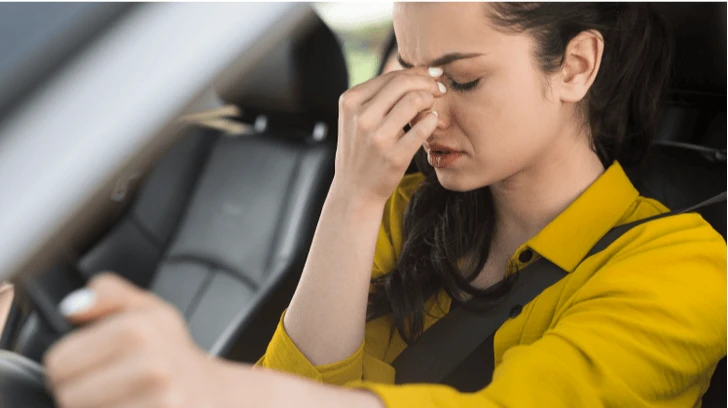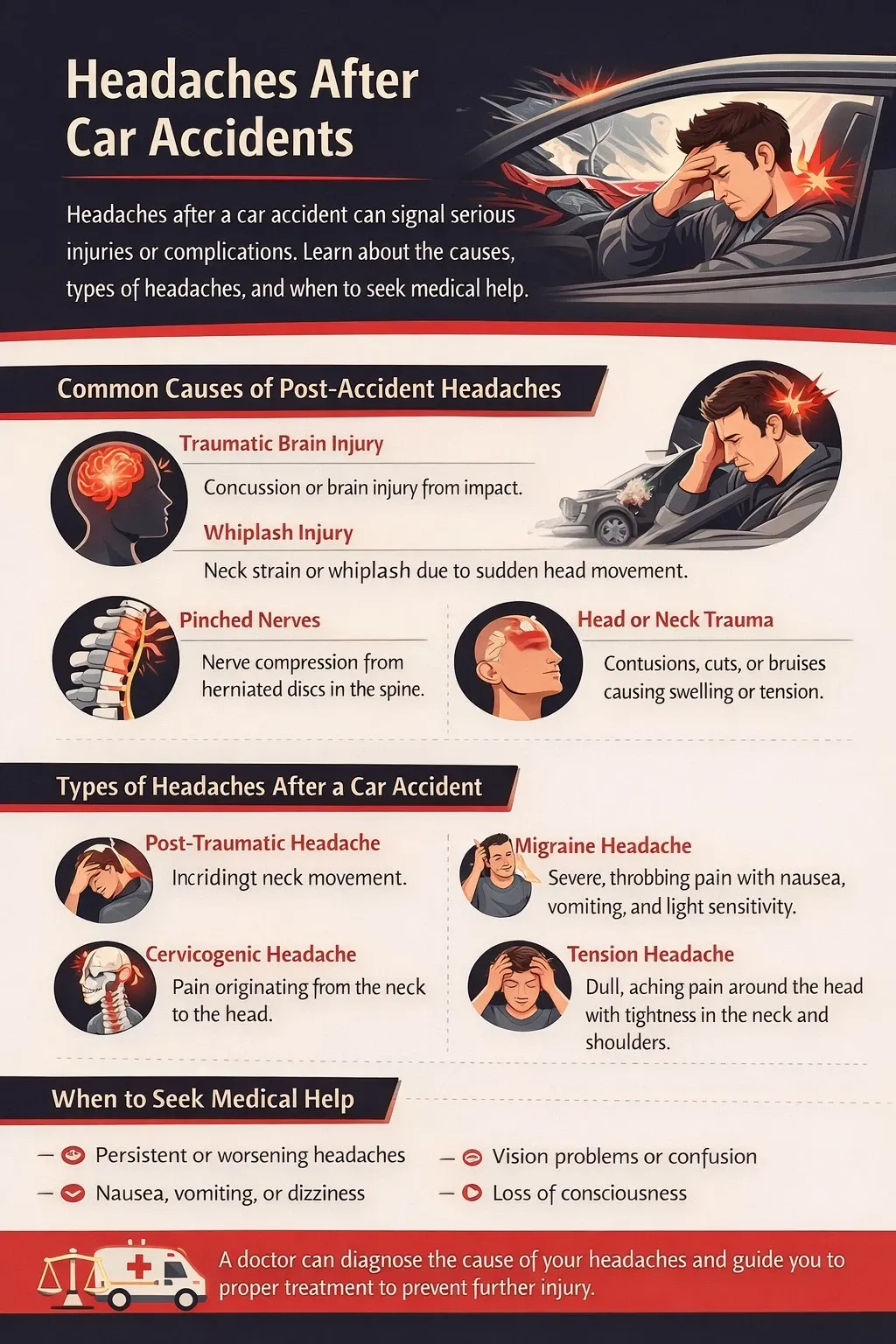- Author: Michael Burry
- May 29, 2025
Headaches are common symptoms after car accidents which occur after some time. Headaches can be disabling car accident injuries when you hit your head in a crash. However, headaches can also be a sign of traumatic brain injuries, which are common in car accidents even if there is no direct head impact. A sudden and violent jolt during car accidents can cause headaches due to the abrupt movement of the brain inside the skull.
Some head pains can be traumatizing as they may become more painful after the car accident. In this article, we will learn about the types, symptoms, causes, and legal considerations of headaches after a car accident.
Specific Headache Types After a Car Accident
Headaches can be extremely painful and can result in complications if not medically evaluated at the right time. Some common types of headaches after a car accident may include the following:
-
Concussion headache: A concussion headache can result from a sudden jolt or impact to the head, even without a direct blow. This type of head pain is caused by brain injury and may be accompanied by light sensitivity and sound sensitivity.
-
Fracture Headaches: A fracture in the neck or skull may cause intense headaches after an accident. Some symptoms may comprise back pain or pain in the neck, and head leading to nausea, seizures, confusion, or stiffness in the neck. A stiff neck can also be a sign of a more serious neck injury or skull fracture.
-
Muscle Strain and Muscle Spasm Headaches: If in the accident, the victim has experienced injury to the soft tissue and neck muscles due to the impact, it may lead to constant headaches or a constant headache after a car accident. It can cause muscle pain or strain. Minor injuries to the soft tissue may not be immediately apparent and can cause headaches a few hours or even days after the accident.
-
Disc Herniation Headaches: If the accident force has led to compression or herniation of the discs in the neck it may lead to headache. In such cases, there may be burning pain or tingling sensation in the neck or arms.
-
Pinched Nerve Headaches: If there is a violent jolt in a car accident, it may lead to compression of nerve roots or disc herniation. The symptoms may include numbness, tingling sensation, or tenderness in the back of the head.
-
Whiplash Headaches: One of the most common types of headaches after a car accident is a whiplash headache caused by rapid force in the neck or head. Whiplash can also cause neck injury and head trauma, and may result in a stiff neck. It may surface days or months after the accident.
-
Occipital Neuralgia and Occipital Neuralgia Headache: Irritation or compression of the occipital nerves or greater occipital nerve can cause severe pain at the base of the skull, known as occipital neuralgia or occipital neuralgia headache. Symptoms may include pain, tenderness, and tingling that radiate from the base of the skull up the back of the head.
-
Cluster Headaches: Cluster headaches are episodic, severe headaches that can occur after trauma, often presenting as painful bursts multiple times a day.
-
Post-traumatic headache: In this type of headache, neck pain will radiate to the head and cause a headache. It may sometimes get delayed and the situation may even be worse than you think. In some cases, it may even lead to brain damage.
If a headache persists or becomes a constant headache, or if you experience symptoms like light sensitivity, sound sensitivity, or a stiff neck, you should see a doctor immediately.

The Urgency of post-accident headaches: Signs to watch for
An injured victim must seek immediate medical attention whenever they experience any of the following symptoms:
-
Severe headache: A traumatic headache will be combined with other symptoms such as weakness in limbs, loss of consciousness, slurred speech, and confusion.
-
Headache which increases with time: A headache that worsens in a day makes it difficult to sleep or wakes you up from sleep.
-
Headache in one eye: A headache that may worsen in just one eye causing redness in that eye.
Some other signs of head injury are vomiting, memory problems, blackouts, and seizures, blood coming from the nose or ears. In such severe symptoms of headache after a car accident, the injured victim needs to see a doctor immediately. If a headache persists or worsens over time, it is crucial to seek medical attention for a prompt diagnosis and to rule out serious complications.
Rare but relevant: Lesser known headache causes
Headaches can be caused according to the following classification:
-
Primary headaches: These include migraine, tension-type headache, cluster headache, and cervicogenic headache. Cervicogenic headache is caused by neck strain or injury, often following a car crash, and is linked to issues in the cervical spine.
-
Secondary headaches: These are headaches caused by another condition, such as infection, head injury, or vascular disorders.
Steps following an accident: Immediate action for headache sufferers
If you have experienced a car accident headache, it could be an indication of brain injury because of a collision. Therefore, in such cases, it is crucial to seek documentation or medical evaluation that will help to pursue compensation for accident-related losses. Some steps you can take if you have a severe headache after a car accident:
-
Call 911: If anyone involved in the accident is injured, call 911 immediately.
-
Seek Medical attention: Contact emergency services or visit a hospital or urgent care center to have your injuries evaluated by a medical professional. Prompt medical care and medical treatment are essential after an motor vehicle accident to properly diagnose and treat injuries such as headaches, traumatic brain injuries, or concussions.
-
Describe your symptoms: Be sure to tell the medical provider about your headache and any other symptoms you are experiencing, such as dizziness or confusion.
-
Follow your doctor’s advice: Your doctor may recommend rest, medication, or other proper treatment options depending on the severity of your injury. Physical therapy and chiropractic care may also be recommended for headache relief and recovery after a car accident, especially for neck tension or whiplash-related pain.
-
Document your injuries: Keep track of your medical records, bills, and any other essential information related to your injury by maintaining a journal. Be sure to note the injury site and all symptoms for insurance and legal purposes. This information will be important if you pursue a personal injury claim.
-
Consult with an attorney: If you have been injured in a car accident and are experiencing headaches or other symptoms, it may be in your best interest to hire a personal injury attorney who can help you understand your legal options for pursuing compensation claims for your injuries and damages.
-
Prepare an Insurance Claim or Personal Injury Lawsuit: Most car accident claims may be settled outside of court. An attorney may help you get a fair settlement. It may include damages caused after an accident that includes economic and non-economic damages. In case they are offering a lower settlement, you may deny the claim and try to pursue a personal injury lawsuit.
Same day appointments are available for accident victims seeking immediate evaluation and care.

Legal Considerations After a car accident
After a car crash accident, the victim has several legal considerations, including the following:
-
Contacting law enforcement: If the accident has resulted in injuries, property damage, or wrongful death, you may contact a law enforcement officer. They can provide you police report which may later be used as evidence.
-
Exchanging information: Try to get the addresses, phone numbers, names, license plate numbers, and insurance information of passengers and other drivers who are involved in the accident.
-
Navigating insurance claims and legal action: After the car accident, it is necessary to file an insurance claim at the earliest. If the victim has no-fault insurance, the insurance company will pay for medical bills and vehicle damage without considering who caused the accident.
-
The importance of documentation in seeking compensation: Try to document all the accident details. You can try to save all receipts, pictures of the accident scene, and medical records.
Do not ignore headaches after a car accident, as they can be a sign of serious injury and may impact your legal claims. Can a headache after a car accident be serious? Yes—any new or worsening headache should be evaluated by a medical professional to rule out underlying injuries and to ensure proper documentation for insurance and legal purposes.
What damages can I seek if I have headaches after a car accident?
Damages in an injury claim refer to monetary compensation that a victim receives for the losses. Damages help an injured victim to seek financial help in the event of losses caused due to another party’s negligence. The following are the types of damages:
Economic Damages
Economic damages can be measured and are easy to calculate as they are in the form of medical bills, repair costs, and other financial expenses. Some examples of economic damages are as follows:
-
Past, current, and future medical expenses
-
Rehabilitation
-
Transportation to and from medical appointments
-
Lost wages
-
Home renovations to accommodate a new disability
-
Out-of-pocket expenses
-
Property damage
-
Loss of earning capacity
-
Assistive medical equipment
Non-Economic Damages
These damages are more challenging to calculate as they cannot be calculated easily. The victim seeks reimbursement for concrete losses such as mental distress, emotional pain, or damage to personal relationships. Non-economic damages are as follows:
-
Emotional distress
-
Loss of enjoyment of life
-
Loss of consortium
-
Pain and suffering
In special situations, the car accident victim may also seek reimbursement for punitive damages. They are awarded to punish the at-fault party for the wrong actions or malicious acts that have harmed another person.
When should I seek legal advice After a Car Accident?
The injured victim must seek legal advice as soon as possible after the accident if they are suffering from headaches or any other pain. Working with an Allentown car accident attorney may help you file the claim, negotiate with the insurance company, identify compensable losses, and file a lawsuit on your behalf.


